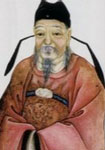《寄无可上人》姚合 翻译、赏析和诗意
诗词《寄无可上人》的中文译文如下:
十二门中寺,
In the temple among the twelve gates,
诗僧寺独幽。
A poet monk resides, solitary and secluded.
多年松色别,
Years have passed, the color of the pine tree has changed,
后夜磬声秋。
At night, the sound of the bell resonates in autumn.
见世虑皆尽,
All worries of the world have vanished,
来生事更修。
For the next life, further cultivation is needed.
终须执瓶钵,
Eventually, one must grasp the alms bowl and staff,
相逐入牛头。
To follow and enter the realm of the Ox's Head.
这首诗词描写了一个寺庙中寂静单独的诗僧。在这座寺庙中,他远离尘世的纷扰,多年来一直守望在松树的身旁。每当夜晚来临,秋天的磬声响起,仿佛在告诉人们岁月的流转。
诗中表达了诗僧对世间事物的超越,他看透了人们所担忧的一切,并意识到来生还需要更多的修行。
最后几句诗描绘了诗僧最终会执着于瓶钵和僧杖,进入“牛头”(佛教修行中的一个境界)的境地。
这首诗给人以宁静和超脱的感觉,传达了人们对生活追求内心平静和超越尘世的愿望。
《寄无可上人》姚合 拼音读音参考
jì wú kě shàng rén
寄无可上人
shí èr mén zhōng sì, shī sēng sì dú yōu.
十二门中寺,诗僧寺独幽。
duō nián sōng sè bié, hòu yè qìng shēng qiū.
多年松色别,后夜磬声秋。
jiàn shì lǜ jiē jǐn, lái shēng shì gèng xiū.
见世虑皆尽,来生事更修。
zhōng xū zhí píng bō, xiāng zhú rù niú tóu.
终须执瓶钵,相逐入牛头。
“相逐入牛头”平仄韵脚
拼音:xiāng zhú rù niú tóu
平仄:平平仄平平
韵脚:(平韵) 下平十一尤
